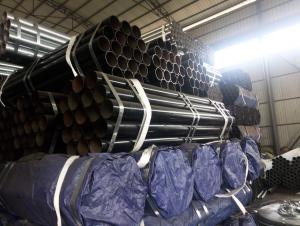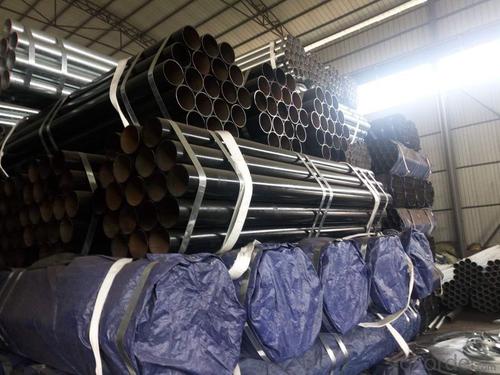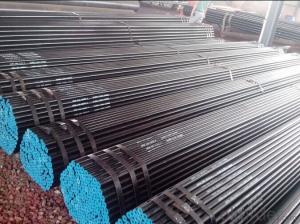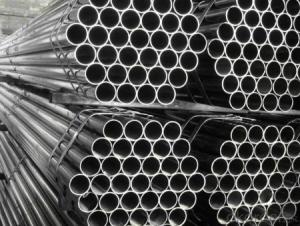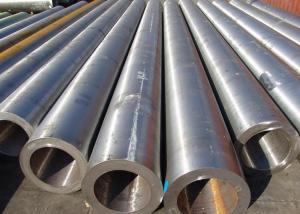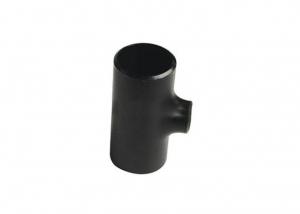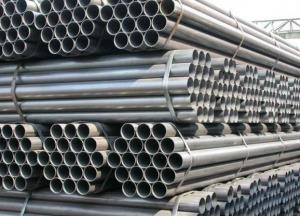Seamless Carbon And Alloy Steel Tubing for sell
- Loading Port:
- Tianjin
- Payment Terms:
- TT OR LC
- Min Order Qty:
- 50 m.t
- Supply Capability:
- 5000 m.t/month
OKorder Service Pledge
OKorder Financial Service
You Might Also Like
1、Structure of Seamless Carbon And Alloy Steel Tubing good sell:
Seamless pipe is formed by drawing a solid billet over a piercing rod to create the hollow shell. As the manufacturing process does not include any welding, seamless pipes are perceived to be stronger and more reliable. Historically seamless pipe was regarded as withstanding pressure better than other types, and was often more easily available than welded pipe.
2、Main Features of Seamless Carbon And Alloy Steel Tubing good sell:
• High manufacturing accuracy
• High strength
• Small inertia resistance
• Strong heat dissipation ability
• Good visual effect
• Reasonable price
3、Seamless Carbon And Alloy Steel Tubing good sell Specification:
Standard | GB, DIN, ASTM ASTM A106-2006, ASTM A53-2007 |
Grade | 10#-45#, 16Mn 10#, 20#, 45#, 16Mn |
Thickness | 8 - 33 mm |
Section Shape | Round |
Outer Diameter | 133 - 219 mm |
Place of Origin | Shandong, China (Mainland) |
Secondary Or Not | Non-secondary |
Application | Hydraulic Pipe |
Technique | Cold Drawn |
Certification | API |
Surface Treatment | factory state or painted black |
Special Pipe | API Pipe |
Alloy Or Not | Non-alloy |
Length | 5-12M |
Outer Diameter | 21.3-610mm |
Grade | 20#, 45#, Q345, API J55, API K55, API L80, API N80, API P110, A53B |
Standard | ASME, ASTM |
1) Material:20#(ASTM A 106/A53 GRB.API5LGRB,GB),45#,16Mn,10#.
2) Specification range:OD:21.3-610mm,WT:6-70mm,length:6-12m or according to the requirement of clients.
3) Excutive standards:GB,ASME API5L.ASTM A 106/A53,Despite of the above standards,we can also supply seamless steel pipe with standard of DIN,JIS,and so on,and also develop new products according to the requirements of our clients!
4) Surface:black lacquered,varnish coating or galvanized.
5) Ends:Beveled or square cut,plastic capped,painted.
6) Packing:bundles wrapped with strong steel strip,seaworthy packing.
4、Packaging & Delivery
Packaging Details: | seaworthy package,bundles wrapped with strong steel strip |
Delivery Detail: | 15-30days after received 30%TT |
5、FAQ of Seamless Carbon And Alloy Steel Tubing good sell:
①How is the quality of your products?
Our products are manufactured strictly according to national and internaional standard, and we take a test
on every pipe before delivered out. If you want see our quality certifications and all kinds of testing report, please just ask us for it.
Guaranteed: If products’ quality don’t accord to discription as we give or the promise before you place order, we promise 100% refund.
②How about price?
Yes, we are factory and be able to give you lowest price below market one, and we have a policy that “ for saving time and absolutely honest business attitude, we quote as lowest as possible for any customer, and discount can be given according to quantity”,if you like bargain and factory price is not low enough as you think, just don’t waste your time.Please trust the quotation we would give you, it is professional one.
③Why should you chose us?
Chose happens because of quality, then price, We can give you both.Additionally, we can also offer professional products inquiry, products knowledge train(for agents), smooth goods delivery, exellent customer solution proposals.Our service formula: good quality+good price+good service=customer’s trust
SGS test is available, customer inspection before shipping is welcome, third party inspection is no problem.
6、Seamless Carbon And Alloy Steel Tubing good sell Images:
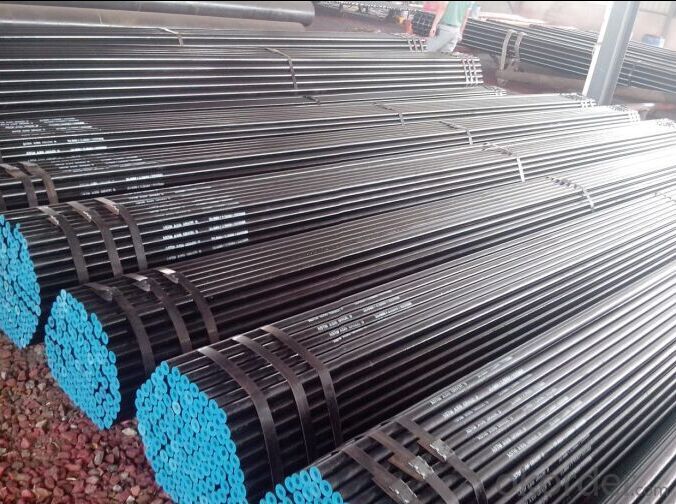
- Q: What is the difference between steel pipes and PVC-O pipes?
- Steel pipes and PVC-O pipes differ in their composition, strength, and durability. Steel pipes are made from a combination of iron and carbon, making them extremely strong and resistant to high-pressure applications. However, they are susceptible to corrosion and may require regular maintenance. On the other hand, PVC-O pipes are made from a specialized form of polyvinyl chloride, which enhances their strength and durability while being corrosion-resistant. PVC-O pipes are also lighter, easier to install, and have a longer lifespan compared to steel pipes. Overall, while steel pipes excel in strength, PVC-O pipes offer a more cost-effective and durable solution for various plumbing and industrial applications.
- Q: What are the different end types for steel pipes?
- There are several different end types for steel pipes, each serving a specific purpose. Some common end types include: 1. Plain End: This is the most basic type of end for steel pipes, where the pipe has no threading or any other special end treatment. Plain ends are typically used for non-threaded applications or when the pipe is intended to be welded. 2. Threaded End: Threaded ends have male threads on one or both ends of the pipe, allowing for easy connection with other threaded fittings or pipes. This type of end is commonly used in plumbing and gas applications where the pipe needs to be easily assembled or disassembled. 3. Beveled End: Beveled ends are cut at an angle, typically 30 or 45 degrees, to facilitate welding. The bevel creates a smooth transition between the pipe and the weld joint, ensuring a strong and secure connection. Beveled ends are commonly used in construction, oil and gas, and pipeline industries. 4. Coupling End: Coupling ends have female threads on both ends of the pipe, enabling two pipes to be joined together using a coupling or a fitting. This type of end is often used in plumbing systems or for connecting sections of pipes that need to be easily disassembled. 5. Flanged End: Flanged ends have a flared or raised lip on one or both ends of the pipe, allowing for easy attachment to other flanged components, such as valves or pumps. Flanged ends are commonly used in industrial applications where the pipe needs to be securely connected to other equipment. 6. Socket Weld End: Socket weld ends have a socket or recess on one or both ends of the pipe, allowing for easy connection with socket weld fittings. This type of end provides a strong and reliable joint, commonly used in high-pressure applications, such as petrochemical or power plants. These are just a few examples of the different end types for steel pipes. The choice of end type depends on the specific application requirements, such as the need for easy assembly, disassembly, or compatibility with other fittings.
- Q: What's the difference between a cracked carbon steel tube and a liquid carbon steel tube?
- If the material is the same, the process is different from the test.
- Q: How are steel pipes used in the manufacturing of automotive exhaust systems?
- Steel pipes are commonly used in the manufacturing of automotive exhaust systems as they possess high strength, durability, and resistance to heat and corrosion. These pipes are used to transport exhaust gases from the engine to the tailpipe, ensuring the safe and efficient operation of the vehicle. They are typically bent and welded together to create a complex network of pipes that helps direct the flow of exhaust gases and reduce noise levels. Overall, steel pipes play a crucial role in the construction of automotive exhaust systems, contributing to their reliability and longevity.
- Q: Is there a weld on the outer wall of seamless steel tube?
- Seamless steel pipe's inner wall, outer wall, section, cross section can not see the weld seam. Because seamless steel pipe is a molding product, no late roll pressure, welding and other processes. No section, inner wall, outer wall or section, as long as there is weld, it is not seamless steel tube. The inner wall can not see the outer wall of welding seam, but it can be seen that the weld products are fake or polished goods. Some products can not be seen without friction and have weld seams on the outside wall. They are seamless treated steel tubes and are polished goods. The price is much different from the real seamless steel tube. Some bad wounding, confusing concepts, earn illegal profits.
- Q: What is the difference between steel pipes and cast iron pipes?
- The main difference between steel pipes and cast iron pipes lies in their composition and properties. Steel pipes are made from an alloy of iron and carbon, which gives them high strength and durability. They are also resistant to corrosion and can withstand high pressure and temperature conditions. On the other hand, cast iron pipes are made from molten iron, which provides them with excellent soundproofing capabilities and resistance to fire. However, cast iron pipes are more prone to corrosion and can be brittle, making them less suitable for high-pressure applications.
- Q: Can steel pipes be used for underground compressed air pipelines?
- Yes, steel pipes can be used for underground compressed air pipelines. Steel pipes are commonly used for underground pipelines due to their strength and durability. They have the ability to withstand high pressure and can resist corrosion and other environmental factors. Steel pipes are also known for their long lifespan, making them a reliable choice for compressed air pipelines. However, it is important to ensure that the steel pipes are properly coated and protected to prevent any potential corrosion issues. Additionally, proper installation and maintenance of the pipelines are crucial to ensure their efficiency and safety.
- Q: What's wrong with the 3PP anticorrosive steel tube?
- Most of the large pipes in our country use 3PE coating, and 3PP and 3PE coating belong to multilayer coating system. It consists of epoxy powder, intermediate layer adhesive and outer layer of PP (polypropylene) jacket.
- Q: How are steel pipes used in the mining industry?
- Steel pipes are commonly used in the mining industry for various purposes such as transporting water, slurry, and other materials, as well as for ventilation and support systems in underground mines.
Send your message to us
Seamless Carbon And Alloy Steel Tubing for sell
- Loading Port:
- Tianjin
- Payment Terms:
- TT OR LC
- Min Order Qty:
- 50 m.t
- Supply Capability:
- 5000 m.t/month
OKorder Service Pledge
OKorder Financial Service
Similar products
Hot products
Hot Searches
Related keywords
